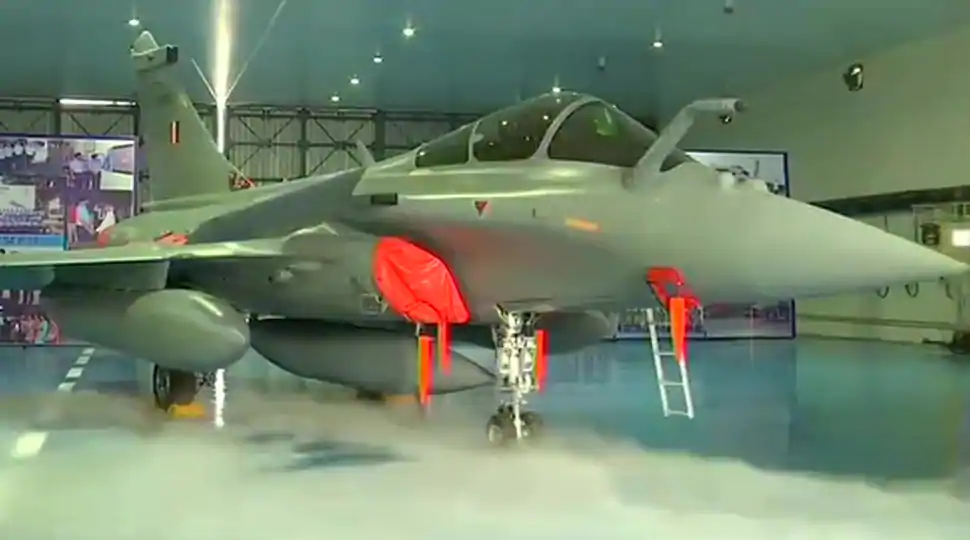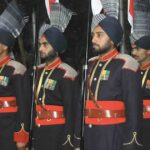
SOURCE: ZEE NEWS
Indian Air Force (IAF) will formally induct five Rafale fighter aircraft into its 17 Squadron, the ‘Golden Arrows’, at the Ambala airbase in Haryana on Thursday. Union Defence Minister Rajnath Singh and his French counterpart Florence Parly will be the chief guests for the event. The first batch of five Rafale jets arrived at the Ambala airbase on July 29 and the IAF had then said that efforts are focused on operationalisation of the aircraft at the earliest.
After their arrival, each jet was given a special water cannon salute at the strategically-located airbase in the presence of top brass of the Indian Air Force including Chief of Air Staff Air Chief Marshal Bhadauria who had played a key role as lead negotiator in the procurement of the jets. Welcoming the arrival of the jets, Prime Minister Narendra Modi, in a tweet in Sanskrit, had said there is no virtue like protecting the nation and there is no vow like the defence of the nation.
A tentative schedule for the induction ceremony said that the event will start at 8 am and conclude post noon. At 8 am, the entry will be opened. The induction ceremony will take place from 10 am to 11.45 am. From 12 noon to 1 pm, Union Defence Minister and his French counterpart will address a press briefing which will be followed by lunch.
Taking to micro-blogging site Twitter, Singh said, “At 10.00 AM tomorrow, Rafale aircraft will be formally inducted into IAF at the Air Force Station in Ambala. The aircraft will be part of 17 Squadron, the “Golden Arrows”. The Rafale jets are India’s first major acquisition of fighter planes in more than two decades.”
A look at how Rafale fighters will be a gamechanger against Pakistan and China:
* Rafale vs China’s Chengdu J-20:
* Combat proven: While China’s Chengdu J-20 jets are called fifth-generation combat jets, compared to 4.5 generation Rafale, the J-20 lacks actual combat experience while Rafale has been used extensively by the French Air Force for its missions in Afghanistan, Libya and Mali. Rafale can also carry more fuel and weapons than the J-20. It is to be noted that Rafale is capable of carrying out at least four missions in one sortie while the J-20 cannot carry out multiple missions in one go.
* Rafale vs Pakistan’s F16: Rafale’s 190-kg Meteor missile has a Beyond Visual Range (BVR) of over 100 km and it can touch , travelling at a top speed of Mach 4. The F-16 jets, used by Pakistan, carry the AMRAAM missile, which has a BVR of 75 km. Rafale can also outperform F16 in dogfights. PAF will have to deploy two F16s to counter one Rafale.
How Rafale will add to the strength of the the IAF:
* More Advanced Technology: The Rafales are armed with ‘Meteor’ air-to-air missiles (120-150 km strike range), ‘Scalp’ air-to-ground cruise missiles (over 300 km) and other armaments. The Meteor missiles are considered the best in the world for air combat duels, with “a greater no-escape zone” for hostile fighters than any comparable BVR (beyond visual range) weapon.
* Combat Proven: With more than 30,000 flight hours in operations, it has proven its worth in combat in Afghanistan, Libya, Mali, Iraq and Syria. On the other hand, Pakistan JF-17 and Chengdu J-20 are yet to be tested in battles or war-like situations.
* IAF’s lack of long-range weapons over: For almost two decades, the IAF has been perceived to be handicapped on long-range weapons and sensors vis-a-vis PAF. Rafale will reverse this and give IAF the decisive edge with better sensors and weapons. Each Rafale in the air would require at least two F16s for a counter-challenge.
* Edge over rivals: The Rafale fighters will be able to outgun and outrun Pakistani F-16 and JF-17 as well as the Chinese Chengdu J-20 fighters. According to sources, the air-to-air and the air-to-ground strike capabilities of Rafales cannot be matched by either China or Pakistan and the aircraft would give India an edge over both the rivals.
* Air superiority: The state-of-the-art 4.5 Generation Rafale jet can reach almost double the speed of sound, with a top speed of 1.8 Mach. With its multi-role capabilities, including electronic warfare, air defence, ground support and in-depth strikes, the Rafale lends air superiority to the Indian Air Force.
* Can avoid being tracked by enemies: The multi-role combat aircraft, reportedly, has a range of between 780-1055 km compared to the 400-550 km of the Su 30 MKI. This means that India will now be able to engage Pakistani aircraft from larger distances, without the risk of being tracked.
* All-weather capability: Meteor provides the all-weather capability to engage a wide variety of targets from fast jets to small unmanned aerial vehicles and cruise missiles.






